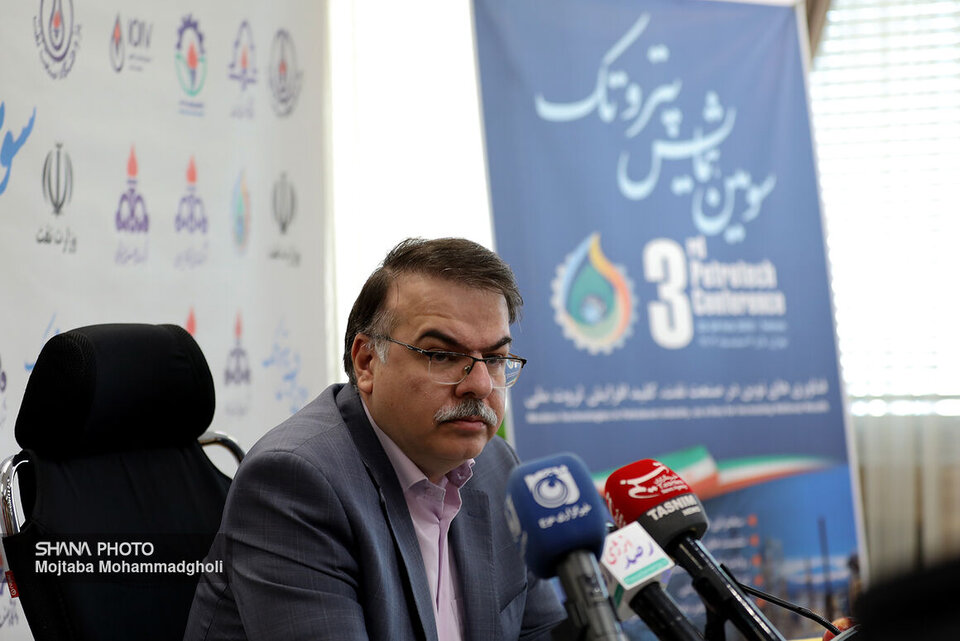Omid Shakeri emphasized that the event, focusing on technology and innovation, will foster collaboration and development in this strategic industry.
Shakeri, speaking at a press conference for the Technology-Based Management Conference (PetroTech) on Saturday, announced that the third PetroTech conference will be held on February 23 and 24, coinciding with Engineering Day, under the slogan "Technology in the Oil Industry, Boosting National Wealth."
He noted that the conference will focus on technological development and support for NTBFs, featuring specialized sessions, a side exhibition, and the signing of major contracts.
Shakeri highlighted that the PetroTech conference has two key objectives: advancing technology and innovation in the oil industry and supporting the private sector and knowledge-based companies.
The event is organized in collaboration with the Engineering Directorate, four major subsidiaries of the Ministry of Oil, and key players in the technology ecosystem, including the Research Institute of Petroleum Industry, technology parks, Petroleum University of Technology, and the Research and Technology Fund.
The deputy minister explained that the conference will showcase the performance of various technology sectors in the oil industry, identify technological needs, and create opportunities for collaboration between NTBFs and the oil sector.
Over 40 NTBFs supported by the oil industry will participate in the exhibition to display their achievements, with a particular focus on private sector support.
Six contracts signed for localization in oil industry
Shakeri announced that six contracts worth 760 billion tomans and €29 million will be signed at the conference, primarily focusing on first-time production and localization of key oil industry equipment. Additionally, nine new products, developed for the first time in the oil industry, will be unveiled.
The conference will feature 15 specialized sessions covering various sectors of the oil industry, including upstream, gas, refining, distribution, petrochemicals, and related topics. Three workshops will also be held on "Hydrogen as a Clean Fuel," "Artificial Intelligence Applications in the Oil Industry," and "Carbon Emission Measurement and Validation."
For the first time, the conference will present narratives of technological development from national oil industry projects, such as the "Crude Oil Transfer from Goreh to Jask" and the development of the "Azar Oil Field," showcasing how key technologies have been implemented in these projects.
Shakeri phasized that flaring gas collection is a critical issue for the oil industry, noting that while the necessary technologies exist domestically, large-scale investment and private sector participation are required for implementation.
A significant portion of flaring gas collection has already been assigned to the private sector and petrochemical companies through specific contracts.
The Deputy Minister highlighted that the number of knowledge-based companies on the Ministry of Oil's list has reached 676, a threefold increase over the past three years.
$172m contracts signed on first-time production
Shakeri revealed that $172 million in contracts for first-time production have been signed so far, with the execution of these contracts expected to save the oil industry $1.7 billion—creating 10 times the initial investment in economic value.
He also addressed the impact of currency fluctuations on oil industry contracts and knowledge-based companies, noting that exchange rate increases since 2017 have affected all projects.
To prevent project delays, mechanisms have been developed to compensate for costs arising from currency fluctuations, including contract amount adjustments, updated financial procedures, and innovative financing solutions.
The Research and Technology Fund of the oil industry has played a significant role in diversifying financing tools, Shakeri said.
A specialized session at the PetroTech conference will introduce these tools, including guarantees for NTBFs, product purchase guarantees, contractual claim mechanisms to ensure timely payments, and product liability insurance to cover risks associated with first-time production.
One of the main challenges for knowledge-based companies is that the oil industry is often reluctant to take risks on new products. Product liability insurance mitigates this risk, allowing companies to confidently offer their products to the oil industry.
So far, two liability insurance contracts and two guaranteed purchase contracts have been signed to support these companies.
Shakeri also highlighted the significant achievement of increasing exports of technical and engineering services by Iranian knowledge-based companies. Over the past two to three years, approximately $500 million worth of technical and engineering services have been exported, primarily to Venezuela and Russia.
Notably, these exports include high-tech products such as cold boxes and turbine blades, which are produced by only a few countries, demonstrating the capability of Iranian companies to compete with international firms in global markets.


Your Comment